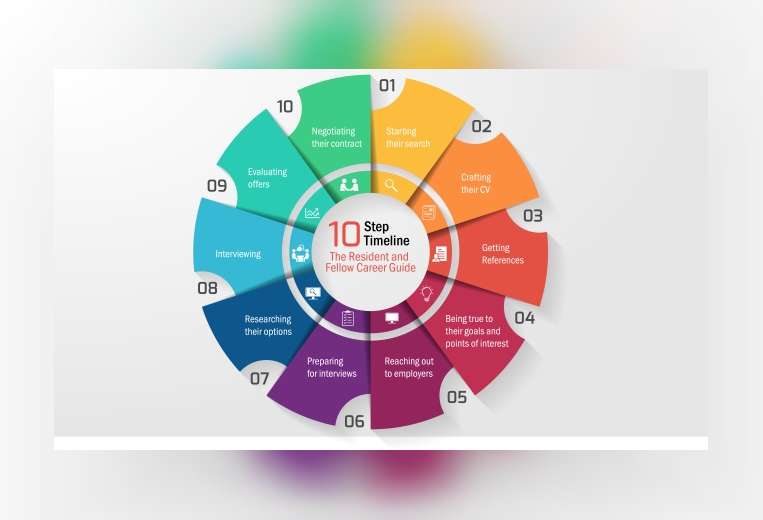10 steps in a candidate's job search
 Posted by Alexandra Cappetta
Posted by Alexandra Cappetta

Just like you have a structure to your physician search, job-seeking residents, fellows and advanced practice providers are best served by developing a plan or strategy to guide them through the steps of their job search. One way they can do that is through the publication First Practice, The Resident and Fellow Career Guide, which proposes a 10-step timeline to help candidates form that strategy - and better connect with you.
As a recruiter, being aware of how candidates are preparing for their search helps you be ready to reach them in the most effective ways. Candidates will prepare by:
Starting their search
Many will start their job search about 12 to 14 months before completing their training. An early start is just as important for recruiters as it is for physicians; if candidates are starting to look for you, you should already be reaching out to them. You could potentially have the chance to connect with interested candidates who aren’t at a point where they can commit to your opportunity - regardless, how you engage with them early on can impact how they’ll consider your opportunity when the time comes.
Crafting their CV
Ah, the beloved CV, your tool for quickly assessing candidates’ experience, interests and qualifications. How much does a CV really tell you about your prospect? If we’re being realistic, the quality of a physician’s care doesn’t come down to how well they can put words on paper, and without meeting them, it’s hard to get a feel for their capacity for leadership, emotional intelligence and personability. In short, a CV won’t tell you everything you want to know. However, it should tell you what you need to know to determine if you’d like to move forward.
Getting references
When you’re reviewing your prospects, you’ll likely receive references along with their CVs. Reference letters can be a huge bonus as you try to get a glimpse into the work ethic and personality of the physician you’re considering. What does the author of the letter feel strongly about when it comes to this individual, and how might those qualities be useful or applied at your facility?
Being true to their goals and points of interest
Just like you have to decide what kind of physician you’d like to hire, job-seeking physicians have to figure out what kind of community and organization they’re searching for in order to find the right fit. Candidates consider how each opportunity aligns with their life purpose, their beliefs and values, past mistakes, success and likelihood for improvement, as well as their short-, medium- and long-term goals. What can you do during this part of the process? Frankly, not much other than ensure you’re well-versed in your company’s opportunity, mission, amenities, etc., and express how those things could meet and nurture each candidate’s needs and values.
Reaching out to employers
When candidates reach out, they have (hopefully) become familiar with physician recruiters and feel prepared to interact with you. Some physicians might contact you to ask about opportunities that aren’t advertised or posted. When they reach out, be receptive, answer their questions, find out what they’re looking for, and most importantly, be ready to meet them wherever they are in their search.
Preparing for interviews
Conducting multiple interviews - some of which are over the phone - means you’re quickly compiling a lot of information, so staying organized is a must. Take notes during and after each interview to keep conversations fresh when you need to revisit them later. A strong interview also requires a healthy balance between speaking confidently and actively listening but be aware that interviewees will be noticing your nonverbal cues as well. How are you sitting? Are your arms crossed? Are you smiling? You’re always saying something to candidates - even when you aren’t speaking.
Researching their options
A candidate might be showing real interest in your opportunity, but it’s important to remember they’ll want to research all their options and will probably have questions. Some questions you might expect candidates to ask are: "What are the main reasons you’re recruiting another physician at this time?" and "What kind of turnover has this group experienced?" Although you can’t account for every possible question, the more prepared you are to answer ones like these and others you’ve been asked in the past, the more prepared you’ll be to share your opportunity’s value.
Interviewing
During the interview process, we tell candidates the more interest they show in the recruiter and the opportunity, the more interest the recruiter will likely show them. If it’s obvious a candidate has lost interest during the interview, ask if there is something they learned or experienced during your time together that caused them to step back. This could go a long way in showing that you still want to reach them and improve your technique moving forward.
Evaluating offers
When the time comes for candidates to evaluate their offers, you might be wondering how you stack up against others. As they consider which opportunity they’ll accept, your prospects will be thinking about the group’s future plans, the philosophy of the facility’s leadership team, anticipated patient load, benefits, location, family adaptability and more. Have your information ready so that you’re prepared to discuss these things when candidates are weighing their options.
Negotiating their contract
Good news: The candidate has chosen your facility and it’s now time for contract negotiation! Bad news: It can take some time for your new hire to fill out all their paperwork, get state licensure and credentialing, and arrange insurance providers - not to mention they’ll likely have their employment contracts reviewed by an attorney. Try to be patient, as most candidates need about six months from the time they finalize their employment agreement until they’ll start seeing patients.
Ultimately, the goals of job-seeking physicians and recruiters are the same: to find their next opportunity. Physicians can use these steps to tighten their job search and prepare for the process, while recruiters can mirror the process to respond accordingly and get ahead on finding their next hire.

